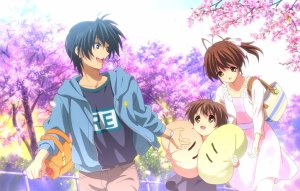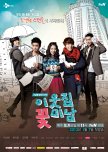Flower Boy Next Door is the deceptively thoughtful story of a lonely, damaged girl who re-enters the world with the help of a quirky new acquaintance, panda-suit wearing, scene stealing, heart-exploding Enrique Geum. Its characters are Flower Boy Next Door’s greatest strength. Even though most of them are slightly exaggerated in the way of Korean comedies, they’re charming and wonderful and utterly sympathetic, and as the show progresses the viewer is completely drawn into their lives.
It also doesn’t hurt that they’re portrayed by a group of incredibly likable actors, led by the lovely, expressive Park Shin Hye. A longtime veteran of dramas like You’re Beautiful and Heartstrings, Shin Hye is able to convey with a single look what would require a thousand lines of dialogue to say. She takes a journey with Dok Mi—from the beginning of the drama to its end, her bashful, downward-staring attitude evolves into the straight-backed posture of someone who knows her own worth.
The ever-handsome Yoon Si Yoon as Enrique proves to be her perfect foil: his childlike candor and propensity toward panda suits is tempered with a powerful sense of empathy and tenderness. He’s an utter contrast to the typical male lead in Kdrama romcoms—instead of being distant and cold, he’s like a burst of sunshine in a dark room. He isn’t prickly and doesn’t withhold his emotions; he gladly shares his heart and his mind with everyone he meets.
The webtoon artists next door were adorable and just really good guys, not to mention totally hot. I'm not really sure why the Japanese guy existed since he kind of appeared out of nowhere, did not push the plot forward at all, and then made an odd exit, but at least he was cute and added to the number of flower boys next door.
Another of Flower Boy Next Door’s primary charms is that it’s not afraid of emotion, much like Enrique. The best of its episodes spend more time on characters talking about their feelings than they do on things like narrative or plot development: emotions serve as the show’s spine and its unifying principle. Most dramas revolve around circumstances that change—Amnesia! Cancer! Birth secrets! Corporate jockeying for power!—but Flower Boy Next Door is so very rewarding to the receptive viewer because it revolves around people that change.
Flower Boy Next Door does an amazing job on the micro level: it creates lovely moments and its characters are lavished with development. From Dok Mi going against her frugal nature to turn up her apartment’s heat whenever Enrique visits, to the evolution of the dark circles under the webtoon editor’s eyes, its meticulous attention to detail and the building-blocks of atmosphere make the show a transporting delight.
Everything about Flower Boy Next Door is beautiful and striking, from its blue/grey/orange color palate to its perfectly chosen props and cadre of dreamy flower boy leads. Throughout, developments in the characters are reflected perfectly in their surroundings. Early on, the drapes in Dok Mi’s apartment are like another character in the show: they’re always present, dark and heavy and made for blocking out the world. But when we’re reintroduced to Dok Mi after the time jump in episode 16, we see that the forbidding drapes are no more. In their place are a set of sheer, floaty curtains that let the daylight stream into her apartment—and into her life.
Through it all, this show is consistently funny and charming, and, its biggest attribute is that it never loses sight of the fact that this is where its heart lies. The other thing going for this series is that it's sixteen 40 minute episodes…Love This Format!!!...Very little time for filler or dragging things out, and everything's usually pretty snappy as a result…Get in, get out, move on to the next scene, episode, series, etc… I wish more K-dramas utilized this format actually.
Cet avis était-il utile?


























